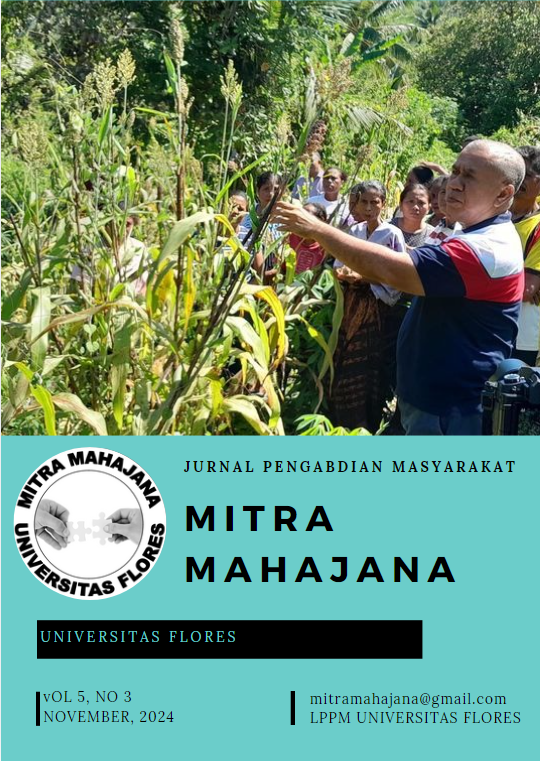EDUKASI PERILAKU BERINTEGRITAS PADA SANTRI PONDOK PESANTREN DARUTTAUBAH
DOI:
https://doi.org/10.37478/mahajana.v5i3.4703Abstract
Integrity means strength, wholeness, completeness, and invulnerability. Integrity behaviour refers to the unity of self and moral honesty. Integrity shows consistency between words and actions in daily life. A person with integrity usually thinks before speaking so that their behaviour and actions align with what is said. Santri is a term for someone who learns or seeks Islamic religious knowledge at a pesantren (Islamic boarding school) in Indonesia. Santri usually lives at the pesantren to follow an educational process involving the teaching of spiritual knowledge. The community service program with the theme "Towards Golden Indonesia 2045 with the Spirit of Santri Based on Intellectuality, Integrity, and Anti-Bullying in the Digital Era," conducted for the santri at Pondok Pesantren Daarut Taubah, aims to increase the awareness of santri to avoid behaviours that lack integrity in the school, family, and community environments, and to make santri individuals who are of integrity, dedicated, and useful to society.
Downloads
Keywords:
education, integrity, studentReferences
Armayanto, H., Ihsan, N. H., & Fauziah, A. (2024). Integrasi Iman dalam Kehidupan Perspektif Yusuf al-Qardhawi: Analisis Hayatan Thayyibatan dalam Islam. In Proceeding International Conference on Tradition and Religious Studies, 3(1), 638–655. https://proceedings.radenfatah.ac.id/index.php/lc-TiaRS/article/view/1235
Bangun, M. F. A. (2023). Pendidikan Karakter Membentuk Kepribadian Anak. Kota Malang: CV Literasi Nusantara Abadi.
Becker, T. E. (1998). Integrity in Organizations: Beyond Honesty and Conscientiousness. Academy of Management Review, 23(1), 154–161. https://doi.org/10.5465/amr.1998.192969
Burhanudin, A. A. (2021). Strategi Penanaman Nilai-Nilai Anti Korupsi Pada Mahasiswa. SALIMIYA: Jurnal Studi Ilmu Keagamaan Islam, 2(2), 54–72. https://ejournal.iaifa.ac.id/index.php/salimiya/article/view/466
Didit, D. (2013). Prinsip-Prinsip Perilaku Organisasi. Surabaya: Pena Semesta.
Fakhrurrazi, & Mirsal, I. (2023). Peranan Pesantren dalam Membangun Karakter Bangsa. Az-Zarnuji: Journal of Islamic Education, 1(1), 31–48. https://doi.org/https://doi.org/10.32505/az-zarnuji.v1i1.5624
Guchait, P., Simons, T., & Pasamehmetogh, A. (2016). Error Recovery Performance: The Impact of Leader Behavioral Integrity and Job Satisfaction. Comell Hospitality Quarterly, 57(2), 150– 161. https://doi.org/10.1177/1938965515613858
KPK (Komisi Pemberantasan Korupsi), & JAGA (Jaringan Pencegahan Korupsi). (2022). Mengenal Perbedaan Korupsi dan Perilaku Koruptif. Pusat Edukasi Antikorupsi Cipta-Karya-Berdaya. https://aclc.kpk.go.id/aksi-informasi/Eksplorasi/20221121-mengenal-perbedaan-korupsi-dan-perilaku-koruptif
Lestari, A., & Mustika, D. (2021). Analisis Program Pelaksanaan Penguatan Pendidikan Karakter (PPK) Di Sekolah Dasar. Jurnal Basicedu, 5(3), 1577–1583. https://doi.org/https://doi.org/10.31004/basicedu.v5i3.912
Peterson, C., & Seligman, M. E. P. (2004). Character Strengths and Virtues a Handbook and Classification. New York: Oxford University Press.
Retnowati, E., & Sinambela, E. A. (2019). Pengaruh Komunikasi Kerja dan Integritas terhadap Kinerja Pegawai. EBIS-Jurnal Ekonomi Dan Bisnis, 9(1). https://ebis-jurnal.unsuri.ac.id/index.php/ebis/article/view/47
Rizaty, M. A. (2023). Selain Al Zaytun, Berapa Jumlah Pesantren di Indonesia? Data Indonesia Id. https://dataindonesia.id/pendidikan/detail/selain-al-zaytun-berapa-jumlah-pesantren-di-indonesia
Salsadilla, Kuntadi, C., & Pramukty, R. (2023). Literature Review: Pengaruh Kompetensi, Profesionalisme Auditor, dan Integritas Terhadap Kualitas Audit Internal. Jurnal Economina, 2(6), 1295–1305. https://doi.org/doi.org/10.55681/economina.v2i6.599
Santoso, G., Damayanti, A., Murod, M., & Imawati, S. (2023). Implementasi Kurikulum Merdeka melalui Literasi Proyek Penguatan Profil Pelajar Pancasila. Jupetra: Jurnal Pendidikan Transformatif, 2(1), 84–90. DOI: https://doi.org/10.9000/jupetra.v2i1.127
Sebayang, D. P., Pitoewas, B., & Halim, A. (2023). Implementasi Pendidikan Anti Korupsi Dalam Tatanan Sistem Sosial Untuk Memperkuat Keadaban Kewarganegaraan. Journal of Education Religion Humanities and Multidiciplinary, 1(1), 39–49. DOI: 10.57235/jerumi.v1i1.1190
Tuhuteru, L., Supit, D., Mulyadi, Abdurahman, A., & Assabana, M. S. (2023). Urgensi Penguatan Nilai Integritas dalam Pendidikan Karakter Siswa. Journal on Education, 5(3), 9768–9775. https://www.jonedu.org/index.php/joe/article/view/1795
Downloads
Published
How to Cite
Issue
Section
License
Copyright (c) 2024 Mic Finanto Ario Bangun, Amalia Syauket

This work is licensed under a Creative Commons Attribution-ShareAlike 4.0 International License.
The authors and other parties are bound to the Attribution-ShareAlike 4.0 International license (CC BY-SA 4.0 DEED) for the published articles. This permits users to:
Share — copy and redistribute the material in any medium or format for any purpose, even commercially.
Adapt — remix, transform, and build upon the material for any purpose, even commercially.
The licensor cannot revoke these freedoms as long as you follow the license terms.
Under the following terms:
Attribution — You must give appropriate credit , provide a link to the license, and indicate if changes were made . You may do so in any reasonable manner, but not in any way that suggests the licensor endorses you or your use.
ShareAlike — If you remix, transform, or build upon the material, you must distribute your contributions under the same license as the original.
No additional restrictions — You may not apply legal terms or technological measures that legally restrict others from doing anything the license permits.






